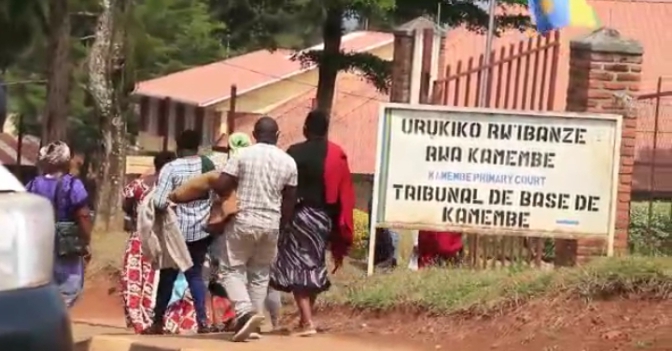By The Rwandan Lawyer
There is reported that people who recently carried out a strike at the intermediate court of Rusizi were arrested. A dozen women, some carrying children, assaulted the headquarters of the Rusizi intermediate court, claiming to be fed up with the injustice exercised by the Kamembe primary court. Indeed, a group of women are victims of swindle committed by criminals who have family links with authorities were manifesting at the intermediate court of Rusizi contending the malicious provisional release of their offenders by the primary court of Kamembe. What is behind such a violent uprising against the Rwandan judicial system? the lines below strive to find out the reasons underlying the sudden uprising of the population of this district far from the capital.
Blessing; Ujamaa; Millionaire; Bitcoin (₿) all but a few area decentralized digital currency, without a central bank or single administrator, that can be sent from user to user on the peer-to-peer bitcoin network without the need for intermediaries. Transactions are verified by network nodes through cryptography and recorded in a public distributed ledger called a blockchain. The cryptocurrency was invented in 2008 by an unknown person or group of people using the name Satoshi Nakamoto. The currency began use in 2009 when its implementation was released as open-source software.
Considered as cooperatives, those systems work on a sort of pyramids whereby the ancient members are funded by the new comers. Unfortunately, these informal systems have often deceived their clients by disactivating their links after probably having got enough amounts they needed from them.
Concerning the case of Rusizi litigants, the dozens of women and men had given their sums estimated to more than 50 millions to Gaspard, his daughter Ange and Nyirabashongore sister of the Mayor of Rusizi District working with Ujamaa; others transferred their money to Esperance a.k.a Bakame operating with Blessing. The women and men lost their money and decided to sue those intermediaries to the Primary Court of Kamembe which examined the eventual provisional detention or provisional liberty. Unexpectedly, the court released them and some of them fled to Kigali and the claimants are wondering how they get back their money especially since banks to which they had took loans are threatening them to seize their houses to be reimbursed. In this tense climate, they demonstrated before the intermediate court demanding the detention of these crooks who took out of their money.
Liability of those intermediaries
The accused mobilized the clients and got money from them promising huge interests from those digital currencies and they did not pay back neither the amounts received nor interests they were forecasting. Given that the claimants were not directly involved, they are not supposed to know or bear challenges encountered by those intermediaries. The latter guaranteed increased amounts and therefore remain fully liable for the reimbursement of money and its interests to the claimants now victims of this kind of swindling unduly impoverishing them. Two offences derive from the facts they committed namely fraud and breach of trust incriminated and punished as following.
Fraud
Any person who, by deception, obtains another person’s property, whole or part of his/her finance by use of false names or qualifications, or who offers positive promises or who threatens of future misfortunes, commits an offence.
Upon conviction, he/she is liable to imprisonment for a term of not less than two (2) years and not more than three (3) years, and a fine of not less than three million Rwandan francs (FRW 3,000,000) and not more than five million Rwandan francs (FRW 5,000,000).
If this offence is committed by a person who intends to issue shares, shareholders’ bills, securities, bonds, vouchers or any other cash value, either for a business company, trading company or industry, the applicable penalty is an imprisonment for a term of not less than three (3) years and not more than five (5) years with a fine of more than five million Rwandan francs (FRW 5,000,000) and not more than seven million Rwandan francs (FRW 7,000,000).
Breach of trust
Any person who is given or entrusted with an item and who is obliged to return it or use it as instructed but who misappropriates, embezzles, scatters or gives it to another person, commits an offence.
Upon conviction, he/she is liable to imprisonment for a term of not less than three (3) years and not more than five (5) years and a fine of not less than five hundred thousand Rwandan francs (FRW 500,000) and not more than one million Rwandan francs (FRW 1,000,000).
Offences committed by the demonstrators
Even if they seem right to sue the offenders who fooled them to unduly take out they money and caused losses, there is prohibited to organize strike without the prior authorization of the authorities and even less when it comes to taking action against judicial institutions. In this regard, the rwandan law determining offences and penalties in general punish such facts as following.
Four offences can qualify the facts of revolt before the judicial premises as following.
-Insulting or causing violence to personnel in the judicial organs
Any person who insults or causes violence to an investigator, a prosecutor, a judge, an advocate, a state attorney, a court clerk, a court bailiff, umwunzi or an arbitrator on duty or in connection with his/her duty,
with an intention to disgrace his/her dignity or respect, by words, gestures or threats, writings or by image of any nature, commits an offence.
Upon conviction, he/she is liable to imprisonment for a term of not less than one (1) year and not more than two (2) years and a fine of not less than one million (FRW1,000,000) Rwandan francs and not more than two million (FRW 2,000,000) Rwandan francs.
If the insults or violence are expressed during court hearing, the penalty that applies is imprisonment for a term of not less than two (2) years and not more than three (3) years.
-Threats against judicial personnel
Any person who threatens an investigator, a prosecutor, a Judge, an arbitrator, an advocate, a bailiff, an Umwunzi, an expert, an interpreter or a translator or any other person commissioned by judicial organs with intention to manipulate him/her into personal interests on official duties, commits an offence.
Upon conviction, he/she is liable to imprisonment for a term of not less than three (3) years and not more than five (5) years with a fine of not less than one million(FRW 1,000,000) Rwandan francs and not more than two million (FRW 2,000,000).
-Discrediting a decision of judicial organs
Any person who discredits an act or a decision of judicial organs, in a manner likely to cause contempt or lack of independence of the judicial organ, by use of statements, writings, images or any act, commits an offence. Upon conviction, he/she is liable to imprisonment for a term of not less than one (1) year and not more than two (2) years and a fine of not less three hundred (FRW 300,000) thousand Rwandan francs and not more than five hundred thousand (FRW 500,000) Rwandan francs or only one of these penalties.
-Contempt of court
According to article 135 of the law nº 027/2019 of 19/09/2019 relating to the criminal procedure, in a court or in any other place where a public court hearing is held, if one or more persons present make noise, express approval or disapproval by causing or stirring up trouble in any way, the presiding judge calls them to order and expel them if they persist and, if necessary, seek intervention of law enforcement forces without prejudice to other penalties provided by law. If the person who causes trouble is a party to the proceedings, the presiding judge call him or her to order and warn him or her that if he or she persists, he or she will expel him or her and continue the hearing as if he or she is present. If he or she is expelled and refuses to leave the courtroom, the presiding judge seeks intervention of law enforcement forces to expel the party by force without prejudice to other penalties provided by the law. If the trouble is caused by a court employee, the provisions of Paragraph One of this Article apply.
Loss of trust in judicial institutions
The court seems having put aside the worries of the victims of that fraud committed by the offenders and released the latter. The victims explicitly suspected bribes granted to the judge especially as the offenders were prosecuted for economic crimes and that they had obviously money to corrupt the court; worse, at the deadline of 5 days for appeal, the public prosecution did not introduce appeal against the decision of the primary court of Kamembe. The reason why they desperately resorted to the intermediate court without hope to get justice. In general, the declarations of the claimants on Ishema TV give impression that courts of Rusizi are generally corrupted to the extent that they deem to recourse to the Head of State the sole authority who may satisfy their requests.
Conclusion
With time, injustice committed by Rwandan judges and prosecutors will entail social revolt as what occurred to the plaintiffs of Rusizi who fed up with a bribed judge of primary court, decided to assault the superior court. Indeed, this is a sort of warning addressed the Rwandan judiciary which has to revisit the ethics of its judicial staff to prevent a general strike with will publicly and violently denounce their misconduct reflecting the lack of independent justice in Rwanda.
































































